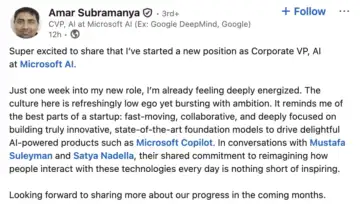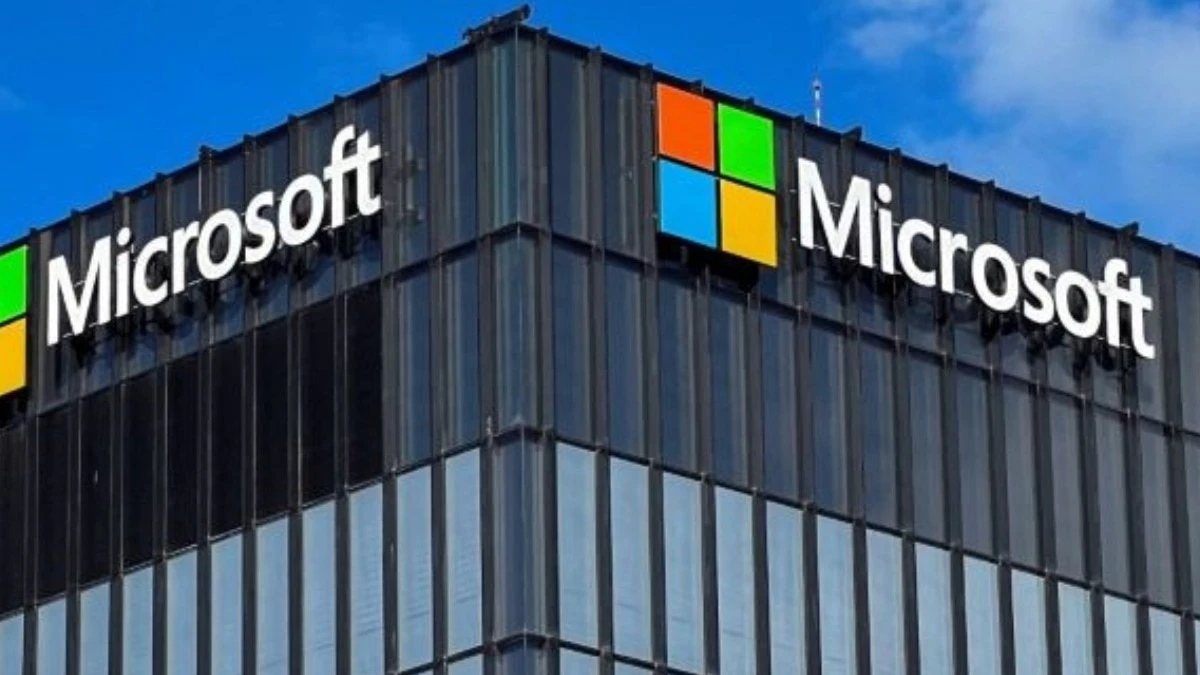Microsoft has hired 24 engineers, researchers and product specialists from Google DeepMind, according to a report by Financial Times. Leading the wave of new hires is Amar Subramanya, former head of engineering for Google’s Gemini chatbot, who recently joined Microsoft as corporate vice president of AI. Subramanya, who spent 16 years at Google, confirmed the move in a LinkedIn post on Tuesday.
“The culture here is refreshingly low ego yet bursting with ambition,” he wrote, praising Microsoft’s team dynamics as he takes on his new role. Subramanya will be contributing to Microsoft’s AI products like Copilot and Bing, under the company’s consumer AI division.
“Just one week into my new role, I’m already feeling deeply energised. The culture here is refreshingly low ego yet bursting with ambition. It reminds me of the best parts of a startup: fast-moving, collaborative, and deeply focused on building truly innovative, state-of-the-art foundation models to drive delightful AI-powered products such as Microsoft Copilot,” Subramanya’s post reads.
 The hiring spree is part of a wider strategy led by Mustafa Suleyman, co-founder of DeepMind and now Microsoft’s head of consumer AI. after the company acquired most of his startup, Inflection, in a $650 million “acqui-hire” deal. Since then, he has built a powerful team by tapping into his former DeepMind network.
The hiring spree is part of a wider strategy led by Mustafa Suleyman, co-founder of DeepMind and now Microsoft’s head of consumer AI. after the company acquired most of his startup, Inflection, in a $650 million “acqui-hire” deal. Since then, he has built a powerful team by tapping into his former DeepMind network.
Other notable DeepMind alumni joining Microsoft include engineering lead Sonal Gupta, senior engineer Adam Sadovsky, and product manager Tim Frank. CNBC reports that many of these hires have taken senior roles within the company. Sadovsky, for instance, left Google after nearly 18 years and is now a corporate VP at Microsoft AI.
The rush for top AI talent is not unique to Microsoft. Big tech companies across the board are offering large incentives to attract researchers and engineers from rivals. OpenAI’s CEO , while Meta also poached . There have been reports that the signing , but the Mark Zuckerberg-led company has repeatedly denied the reports, and said that the .
That said, the competition between Microsoft and Google is particularly intense. Suleyman’s move to Microsoft has put him in direct competition with his former DeepMind co-founder, Demis Hassabis, who continues to lead the lab at Google. Despite the departures, a person close to Google claims that DeepMind’s attrition rate is still below the industry average and that it too has recruited talent from Microsoft.
In separate news, Microsoft has recently also made headlines in the healthcare AI space. Under Suleyman’s leadership, the company recently unveiled a diagnostic tool it claims is four times more accurate than human doctors. The system, called MAI Diagnostic Orchestrator (MAI-DxO), combines the power of leading AI models like ChatGPT, Claude, and Gemini to analyse patient symptoms, run virtual tests, and suggest diagnoses. In trials, the AI outperformed a panel of human doctors on hundreds of complex medical cases.
While Microsoft has been building its AI portfolio, the company also , which was roughly 4 per cent of its global workforce, raising questions about the balance between cost-cutting and aggressive hiring in key areas like AI.
